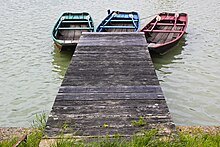stég
Hello, you have come here looking for the meaning of the word stég. In DICTIOUS you will not only get to know all the dictionary meanings for the word stég, but we will also tell you about its etymology, its characteristics and you will know how to say stég in singular and plural. Everything you need to know about the word stég you have here. The definition of the word stég will help you to be more precise and correct when speaking or writing your texts. Knowing the definition ofstég, as well as those of other words, enriches your vocabulary and provides you with more and better linguistic resources.

stég (sense 2)
Hungarian

Etymology
Borrowed from German Steg (“path made of planks; jetty; gangplank”),[1] from Old High German steg. Compare Serbo-Croatian štȅg (“river wharf; spacer”).
Pronunciation
Noun
stég (plural stégek)
- (nautical) landing stage (floating platform facilitating passage between the wharf and a vessel)
- a small dock or jetty, made of planks, used for entering the water, sunbathing or mooring boats
- (typography) a spacer, often made of metal, used to fill empty spaces in typesetting
Declension
| singular | plural | |
|---|---|---|
| nominative | stég | stégek |
| accusative | stéget | stégeket |
| dative | stégnek | stégeknek |
| instrumental | stéggel | stégekkel |
| causal-final | stégért | stégekért |
| translative | stéggé | stégekké |
| terminative | stégig | stégekig |
| essive-formal | stégként | stégekként |
| essive-modal | — | — |
| inessive | stégben | stégekben |
| superessive | stégen | stégeken |
| adessive | stégnél | stégeknél |
| illative | stégbe | stégekbe |
| sublative | stégre | stégekre |
| allative | stéghez | stégekhez |
| elative | stégből | stégekből |
| delative | stégről | stégekről |
| ablative | stégtől | stégektől |
| non-attributive possessive – singular |
stégé | stégeké |
| non-attributive possessive – plural |
stégéi | stégekéi |
| possessor | single possession | multiple possessions |
|---|---|---|
| 1st person sing. | stégem | stégjeim |
| 2nd person sing. | stéged | stégjeid |
| 3rd person sing. | stégje | stégjei |
| 1st person plural | stégünk | stégjeink |
| 2nd person plural | stégetek | stégjeitek |
| 3rd person plural | stégjük | stégjeik |
Derived terms
(Compound words):
References
- ^ stég in Károly Gerstner, editor, Új magyar etimológiai szótár [New Etymological Dictionary of Hungarian] (ÚESz.), Online edition (beta version), Budapest: MTA Research Institute for Linguistics / Hungarian Research Centre for Linguistics, 2011–2024.
Further reading
- stég in Bárczi, Géza and László Országh. A magyar nyelv értelmező szótára (“The Explanatory Dictionary of the Hungarian Language”, abbr.: ÉrtSz.). Budapest: Akadémiai Kiadó, 1959–1962. Fifth ed., 1992: →ISBN